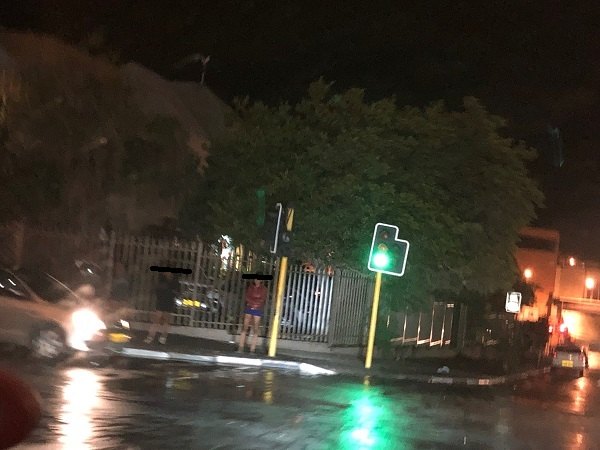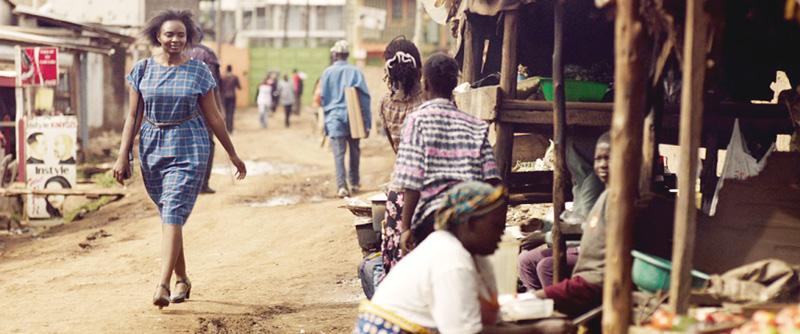
Life in the City – when the light turns soft, the streets come alive

It’s 21:00 on a drizzling, busy, wet Saturday night in the heart of Windhoek. On the surface, the city seems quiet, even relaxed, laid back, as just Windhoek can be. But look deeper, and the shadows start coming to life. There are people out there and they are working.
Scouting the area along lower Independence Avenue where three night clubs, Chez, Ntemba and Monaco share the same precinct, it is apparent that prostitution is thriving despite any statement to the contrary by the City Fathers.
This is not a casual stroll, the intention is to entice the night girls to come out, talk about their experiences, and if they feel like it, even allow their picture to be taken. Wandering the streets in a northerly direction, our group, with only one male in it, observed several ladies leaning over to talk to as yet unknown customers, through open car windows.
Much to our surprise, our male companion was asked “do you want business”?
To Namibians, prostitution is part of an illegal market but when one drives through certain areas of Windhoek at night, the signs of an active prostitution trade are undeniable
Prostitution or commercial sex work has been defined as the rendering of “sexual services on a regular, indiscriminate and emotionally indifferent basis for payment but not necessarily money. There are no labour unions for sex workers to represent their interest.
If you take a drive along the streets near Gustav Voigst Centre in the evenings, you will notice women dressed in miniskirts and high-heeled shoes standing at the traffic lights, apparently minding their own business but as our investigation would soon reveal, very intent on striking a deal.
Prostitution takes two forms, the first where the women has sexual intercourse with a man or where a man has sexual intercourse with a man for food, clothes and other household support. The second form is where a women or a man openly solicits for sex in exchange for cash.
Namibian politicians and other leaders are known for a conservative set of values, condemning “immoral” practices such as prostitution. On the other hand, sexist values are equally widespread, leading to the condemnation of women prostituting themselves but not of the men buying their sexual services.
Dr. Libertina Amathila when she was the Minister of Health argued that legalising the trade would empower sex workers to negotiate safer sex and help slow the spread of HIV, because they could then be tested, treated, counselled and educated about sexually transmitted diseases.
However this was not supported by Elma Dienda, Member of Parliament, who abhors any form of legalizing prostitution because this will degrade mothers, daughters and sisters with such intentions. At that time, she did not see any benefit from the intended legislation except for diseases being spread, and children growing up as orphans.
Our group interviewed three sex workers to shed some light on their experiences of how they operate. For their protection, they will be referred to as ‘Monde’, ‘Kasandra’ and ‘Cherry’.
Monde who has been working in Namibia for two and half years as an undercover commercial sex worker, is a Zimbabwean national. She rents a small room in Windhoek North where she stays during the day and conducts her business at night, sharing the business side with six other women from the same country.
Monde says their customers vary from “quickies’ to ‘all-nights’. Quickies know exactly what they want, and they want it immediately. All-nighters, she said are more gentlemanly. These clients will mostly book a room at a cheap B&B to spend the night.
Depending on the service a client needs, sex without a condom for 30 minutes fetches a fee ranging between N$500 and N$1000. The same service with a condom is substantially cheaper, with an asking price of only N$200 to N$350.
“Most of our regular clients are taxi drivers who come to the flats at lunch hours and after 20:00 and we charge them a special price. For taxi drivers their fees range between N$100 and N$150, making up the bread and butter part of their daily turnover.
“Although we insist that clients should pay upfront, sometimes clients run off without paying for sex or even beat us up” laments Monde. “But since this is an illegal business, we are vulnerable to abuse by the clients and it’s difficult to get any protection from the authorities. We become victims of harassment by clients and the police,” she observes.
Cherry and her Namibian boyfriend who is also her pimp, operates on a close-circle arrangement where the boyfriend will arrange for sex from referrals and people he knows a little. In some cases, the referral is commissioned. However, Cherry says health risks are an issue here, simply because “you will find a client who will insist to have sex without a condom and because of the money and for the fear of losing a customer, I will agree.” Sometimes an infected person may however insist to use protection during sex, says Cherry.
All three ladies say that they are fortunate to be visited now and then by some health workers who supply them with health kits as well as testing them on voluntary bases.
“Despite prostitution being illegal in Namibia, our income is generated from it and we only want sex work to be legalised so we have alternatives”, says Kasandra, a mother of two, who operates from her lavish home in Cimbabasia. Most of her clients are rich foreign men whom she usually meets through a networking team of other girls in other countries. She says her clients have all sorts of fetish fantasies like using her mouth as a latrine but she adds that she charges in foreign currency.
According to the 2018 Labour Force survey, the Youth Unemployment Rate in Namibia increased to 46.10 percent in 2018 from 43.40 percent in 2016. The rate averaged 41.70 percent from 2012 until 2018, reaching an all-time high of 46.10 percent in 2018 and a record low of 37.80 percent in 2012.
Vocal opponents, Vincent Shimutwikeni and Tuhafeni Muhongo argue that proponents of decriminalisation have gone as far as stating that a regulated commercial sex work industry would be beneficial in that ‘jobs’ would be created for many unemployed Namibians, and further, that government would be able to raise revenue in a form of levy.
The duo further state that proponents of legal prostitution often ignores the prevailing socio-economic circumstances in Namibia, as well as the welfare provisions in the Namibian Constitution, which the government must afford all citizens.
They argue that the time is not ripe to decriminalise commercial sex work and that such decriminalisation would in any event fall short of the dictates of the country’s Constitution. “Instead, the government must be held to its constitutional mandate of creating the welfare state that Namibia was originally envisaged to be,” they say in effect implying that the government is responsible to ensure that sex workers have access to another form of income.
“The Namibian Government should similarly formulate and adopt policies that would yield tangible results in terms of poverty reduction and eventual eradication. Poverty, which is the root cause of commercial sex work in Namibia, should rather be addressed as opposed to decriminalising commercial sex work, an exercise that would bear detrimental societal effects,” they say.
Whether this rather simple view is shared by our three respondents, is open for debate. All three girls agree that they are not on the streets for their enjoyment, they are there to earn an income. Even Cherry’s boyfriend agrees that he is not entirely comfortable with her line of work, but he stresses that they have no other means of earning money.
They live in real fear of contracting HIV, or worse, getting pregnant because that would take them our of their work for a couple of months. All in all, despite the outwards appearance of pseudo-glamour, it is not the type of job I wish even for my enemies.
Caption: The sex workers who operate from the various street corners of Windhoek refused us an interview, however we managed to sneak a picture whilst they were on duty.













































